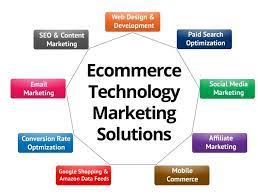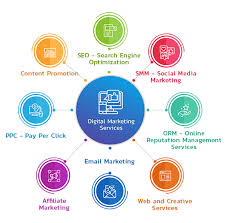The Power of Search Engine Optimization in Digital Marketing
Search Engine Optimization (SEO) plays a crucial role in the world of digital marketing. It is the practice of optimizing your website to improve its visibility on search engine results pages (SERPs). By implementing effective SEO strategies, businesses can drive organic traffic to their websites and enhance their online presence.
One of the key benefits of SEO is that it helps businesses rank higher on search engine results for relevant keywords. This increased visibility can lead to more clicks, website visits, and ultimately, conversions. By optimizing your website’s content, meta tags, and backlinks, you can improve your chances of appearing at the top of search results.
Moreover, SEO is a cost-effective strategy compared to paid advertising. While paid ads can generate immediate results, they require ongoing investment. On the other hand, SEO efforts can have long-lasting effects and continue to drive organic traffic over time without additional costs.
Another important aspect of SEO is that it enhances user experience. By optimizing your website for search engines, you are also improving its usability for visitors. This includes creating relevant and valuable content, ensuring fast loading times, and making it mobile-friendly – all factors that contribute to a positive user experience.
In today’s competitive digital landscape, having a strong SEO strategy is essential for businesses looking to stand out online. By investing time and resources into optimizing your website for search engines, you can attract more organic traffic, increase brand visibility, and ultimately drive business growth.
Overall, Search Engine Optimization is a powerful tool in digital marketing that can help businesses reach their target audience effectively and achieve their online goals. By staying up-to-date with the latest SEO trends and best practices, businesses can position themselves for success in the ever-evolving digital world.
Mastering Digital Marketing: 8 Essential SEO Questions Answered for Enhanced Online Visibility and Success
- What is Search Engine Optimization (SEO) in digital marketing?
- Why is SEO important for businesses in digital marketing?
- How does SEO help improve website visibility on search engines?
- What are the key components of an effective SEO strategy?
- Is it better to focus on organic SEO or paid advertising for online visibility?
- How long does it take to see results from SEO efforts?
- What are some common mistakes to avoid in SEO practices?
- How can businesses measure the success of their SEO campaigns?
What is Search Engine Optimization (SEO) in digital marketing?
Search Engine Optimization (SEO) in digital marketing refers to the practice of optimizing a website to improve its visibility and ranking on search engine results pages (SERPs). By strategically implementing SEO techniques such as keyword research, content optimization, and link building, businesses aim to attract organic traffic and increase their online presence. SEO is essential for enhancing a website’s relevance to search engines like Google, Bing, and Yahoo, ultimately leading to higher visibility, increased website traffic, and improved chances of reaching target audiences effectively. In essence, SEO is a fundamental component of digital marketing that helps businesses improve their online visibility and drive sustainable growth.
Why is SEO important for businesses in digital marketing?
Search Engine Optimization (SEO) is crucial for businesses in digital marketing because it is the key to increasing online visibility and driving organic traffic to their websites. By optimizing their online presence for search engines, businesses can improve their chances of appearing at the top of search results, making it easier for potential customers to find them. A strong SEO strategy not only helps businesses attract more visitors but also enhances user experience, builds brand credibility, and ultimately leads to higher conversion rates. In today’s competitive digital landscape, having a solid SEO foundation is essential for businesses looking to succeed and thrive online.
How does SEO help improve website visibility on search engines?
Search Engine Optimization (SEO) plays a crucial role in improving website visibility on search engines by implementing various strategies that enhance a website’s relevance and authority. By optimizing on-page elements such as meta tags, headings, and content with relevant keywords, SEO helps search engines understand the context of a website’s content. Additionally, building quality backlinks from reputable websites signals to search engines that a website is trustworthy and authoritative, further boosting its visibility in search results. Regularly updating and maintaining SEO practices ensures that a website remains competitive and visible to its target audience, ultimately driving organic traffic and increasing online presence.
What are the key components of an effective SEO strategy?
When considering the key components of an effective SEO strategy in digital marketing, several crucial elements come into play. Firstly, comprehensive keyword research is essential to identify relevant search terms that align with your target audience’s intent. On-page optimization, including optimizing meta tags, headings, and content for keywords, is vital for search engine visibility. Quality content creation that is both informative and engaging not only attracts users but also improves search rankings. Building high-quality backlinks from reputable websites further enhances your site’s authority in the eyes of search engines. Regular performance tracking and analysis allow for adjustments to be made to the strategy based on data-driven insights, ensuring continuous improvement and success in the competitive online landscape.
Is it better to focus on organic SEO or paid advertising for online visibility?
When considering online visibility in digital marketing, the question of whether to focus on organic SEO or paid advertising often arises. Both organic SEO and paid advertising have their unique advantages and play important roles in a comprehensive digital marketing strategy. Organic SEO, while requiring time and effort to see results, can provide long-term benefits by improving search engine rankings and driving sustainable organic traffic to your website. On the other hand, paid advertising offers immediate visibility and control over targeting specific audiences, but it requires ongoing investment to maintain results. Ultimately, the optimal approach may involve a combination of both organic SEO and paid advertising to maximize online visibility and reach a broader audience effectively.
How long does it take to see results from SEO efforts?
One frequently asked question in the realm of search engine optimization (SEO) in digital marketing is, “How long does it take to see results from SEO efforts?” The timeline for seeing tangible results from SEO initiatives can vary depending on various factors such as the competitiveness of the industry, the current state of the website, and the effectiveness of the SEO strategies implemented. Generally, it can take anywhere from a few weeks to several months to start noticing significant improvements in search engine rankings and organic traffic. Consistent and strategic SEO efforts over time are key to achieving sustainable results and maximizing the benefits of optimizing a website for search engines.
What are some common mistakes to avoid in SEO practices?
When it comes to Search Engine Optimization (SEO) practices in digital marketing, there are several common mistakes that businesses should avoid to ensure the effectiveness of their strategies. One common mistake is keyword stuffing, where websites excessively use keywords in an attempt to manipulate search engine rankings. This can result in a poor user experience and may lead to penalties from search engines. Another mistake is neglecting mobile optimization, as more users are accessing websites on mobile devices. Ignoring technical SEO aspects like site speed, broken links, and XML sitemaps can also hinder a website’s performance in search results. Lastly, failing to create high-quality and relevant content for users can undermine the overall SEO efforts. By being aware of these common pitfalls and implementing best practices, businesses can optimize their websites effectively for search engines and improve their online visibility.
How can businesses measure the success of their SEO campaigns?
Businesses can measure the success of their SEO campaigns through various key performance indicators (KPIs) that reflect the impact of their efforts on search engine rankings, organic traffic, and conversions. Metrics such as organic search traffic, keyword rankings, click-through rates, bounce rates, and conversion rates can provide valuable insights into the effectiveness of an SEO campaign. By analyzing these KPIs regularly and comparing them against established goals and benchmarks, businesses can assess the performance of their SEO initiatives and make data-driven decisions to optimize their strategies for better results.




